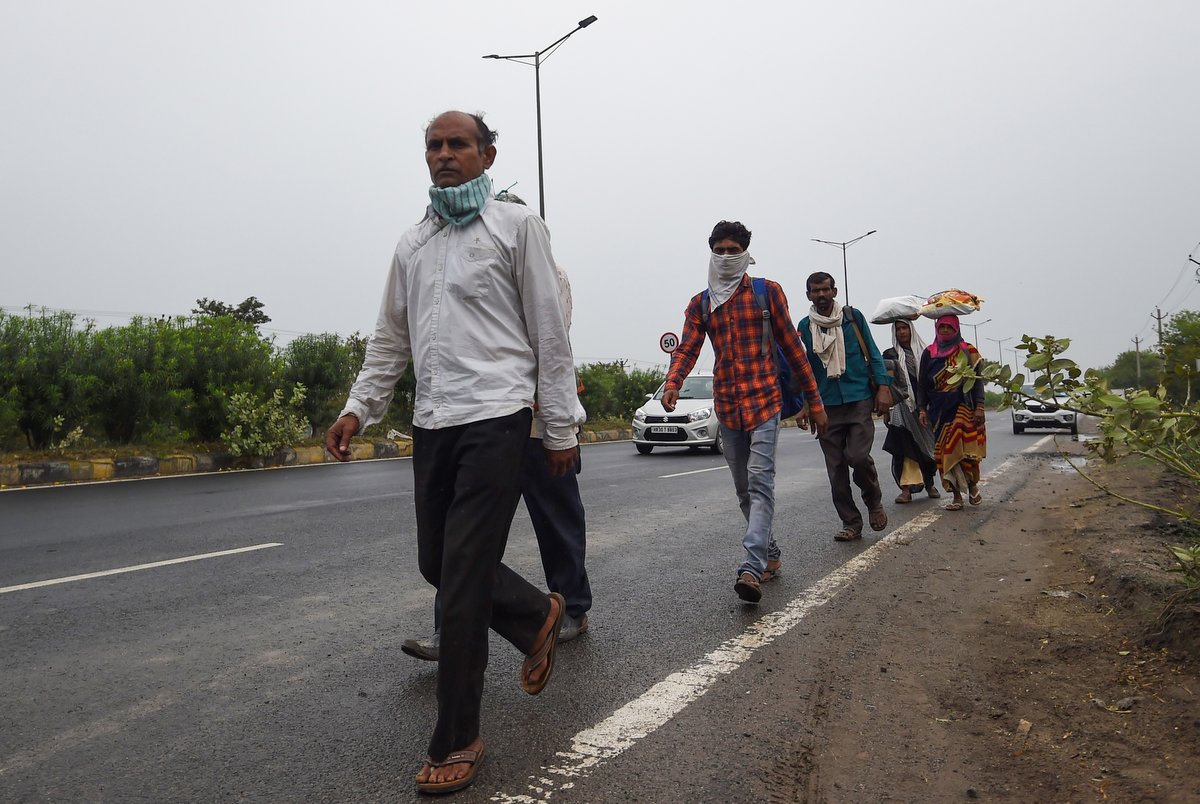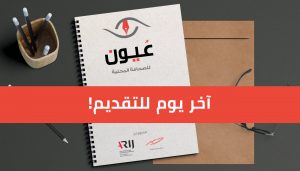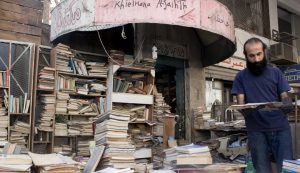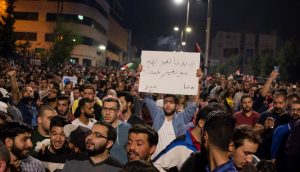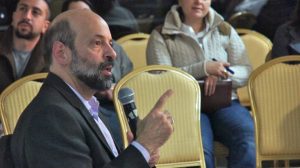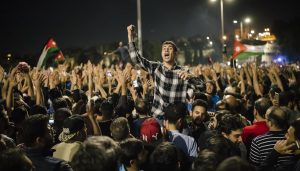By Raghda Butros
When I was four or five, I was plagued by a question that Arab adults love to torment children with: “who do you love more, your mother or your father?” This is a question for which there is no right answer, and one which, it would seem, is only intended to make you squirm. I would opt for the safe and truthful answer, that I love them both the same. But that never really satisfied anyone. “No,” they would say, “you must love one more than the other, now which is it?” And so began a life filled with similar questions intended to force me to make impossible choices.
When I was in first grade, the teacher asked us to divide into two groups, Muslim and Christian, for Religious Education classes. I was one of several kids who was not quite sure, and so I went to the class with most of my friends in it, which happened to be the Islamic studies class. With a surname like “Butros”, which to those of you who don’t know, translates into “Peter” in English, I was soon caught out and sent packing to the other group. I went home crestfallen; to tell my mother I had been pulled out of class. Having been a troublemaker from prior to my birth it seems, she immediately retorted with the usual “what have you done now?” To which I could, for once, respond with an innocent shrug.
We moved to London several years later, and when I would came back to Amman on holiday, I would be confronted with the inevitable question: “which do you like better, Amman or London?” This was an easy one. By the time I had finally arrived in Amman after several months away, I was full of longing for my city of birth and the place that was always home. “Amman, I would proudly say” only to be faced by looks of dismay and disbelief. “Who could possibly prefer Amman to London?” they would say. There is no doubt, though, that as much as I love Amman, I also loved London, and still do.
In London, I went to an Arab school, where I met and interacted with a wide mix of people from different Arab nationalities, and formed lifelong friendships. This contributed both to my love of diversity, and to my identity as an Arab, of which I have always been proud. When I meet other Arabs anywhere in the world, including a chance encounter with a group of Moroccans and Algerians in Kobe, Japan – of all places – I always feel an instant affinity as we launch into heated discussions, heaping praise and expressing our woes about our home countries and the Arab Nation as a whole. Lately people have begun to ask me: “why do you care so much about Egypt or Yemen, or Tunisia or Syria or Libya?” You’re Jordanian, they say, and you have to choose!
When I lived in the States as an adult, people would ask me: “what’s it like being an Arab Christian?” I would say “it feels normal,” which it does. Another choice question would inevitably arise: “but which are you more, a Christian or an Arab?” Again, I felt no urge to choose, because in fact this is not a matter of choice. I am both, and I am more. I would tell people, partially to challenge their mindset, but also because it is true: “I’m Christian by religion, Muslim by culture, and secular by outlook.” Islam is a part of me. I have lived, breathed and experienced it in ways that are intrinsic to who I am. Brought up by wise parents as I was, they never believed in any form of segregation. Our lives were mainstream Jordanian middle class, which meant we lived in a neighborhood that was primarily Muslim, went to a school that had predominantly Muslim kids, and spent our free time at the Al-Hussein Sports City, a dream park for every Ammani child.
I make references to being middle class. I do so because it is part of who I am, but it is also no longer solely who I am. Growing up middle class in Amman in the eighties and early nineties had a certain undeniable charm. Those of us who lived these times remember playing for hours in the city’s streets, and being welcomed into neighborhood homes for meals and drinks. We remember feeling completely unafraid. We had simple lives that were rich with community, discovery and a deep sense of freedom. Amman was not exciting then, and as we grew older we often complained that there was little to do, but I always say Amman became exciting just about the time that I found myself longing for the simplicity of its past.
This sense of nostalgia for community, and a deep desire to alter my somewhat myopic middle class view, has shaped my career. Spending many days, months and years in some of Amman’s oldest neighborhoods, for work and socially, has been nothing short of life altering. Having consciously chosen to burst my own little bubble and challenge all my assumptions, misconceptions, and habits, I gained not only a new perspective, but a whole set of friends and acquaintances that I would have otherwise never have had. I found the sense of community I was looking for, and much more, but I also discovered a new aspect of myself – a person who now chooses, as much as possible, to exist beyond class boundaries and imposed identities. Inevitably I have been asked: “which do you prefer West Amman or East Amman?” I tap into the wisdom of the younger me and say “I love all of Amman the same.”
At various points in my life, I have been asked another impossible question: “do you consider yourself Jordanian or Palestinian?” For me, this has never been a matter choice. I was always both, and felt privileged to be the proud possessor of two homelands, rather than just one. Granted one of these homelands was not really mine to live in or even see, but it was nonetheless one I had learnt to love through the stories of my parents and their parents which were woven through my memory as if they were my own. In fact, when I finally had the opportunity to visit Palestine, I sent a text message to my sister to say “it’s as if I never left,” and had to be reminded by her that I had never been. Jordan, on the other hand, is my home, it is part of who I am and in my mind our identities are inseparable. I love Jordan with a passion that it is purely my own, and will work for it with every ounce of my being. As a child, I adopted what what would become a sort of epithet of sorts, and became known as “Raghda the Jordastinian.” It was cute when I was ten, and people laughed, though still often insisting, that I really ought to make up my mind.
Several years ago, I met and fell in love with Baker, who is Muslim. We debated what our families would say or think, but were confident they would be fine with our decision to get married. We wondered what our extended families or society at large would think and say, and to our pleasant surprise, there was barely a rumble. In fact, when Ammon News announced our engagement (don’t ask me why), we received hundreds of messages of congratulations from people we did not know, and only a couple of unpleasant remarks – and we all know how outspoken Ammon News commentators can be! Now, almost three years later, we are often taken aback by how much of a total non-issue it has been. We share so much in common by virtue of our upbringing, that we are almost too similar at times. A choice question has still arisen though: “will you remain Christian or will you convert to Islam?” I’m safe with this one though, because regardless what my ID card has embossed on it, or whether anyone else agrees, I feel that I am both.
Baker comes from a big tribe in Salt, which has added yet another angle to my life. We visit often to spend time with the family. This is an aspect of life in Jordan which I missed out on growing up. We did not have family outside Amman and though we often took drives to see the rest of Jordan, I was always curious as to what my friends got up to when they spent weekends and holidays with their families in other parts of the Country. These visits truly are a window into another type of life, and I look forward to every visit to learn more, to laugh and to explore yet another dimension of what it means to be Jordanian. Thanks to my new family, I can now claim to no longer be a purely Ammani Jordanian person, which I had always previously felt I was.
There are others, like me, who have grown tired of all the choices they have had to make along the way – and choose instead to call themselves global citizens. I share their desire to cut through the tangled labyrinth of nationhood and ethnicity, and openly embrace all the world has to offer. I think, however, that even that definition is somehow too narrow. I quote Amin Maalouf “identity cannot be compartmentalized; it cannot be split in halves or thirds, nor have any clearly defined set of boundaries. I do not have several identities, I only have one, made of all the elements that have shaped its unique proportions.”
So here I am – An Arab Christian Muslim Secular Jordanian Palestinian citizen of the world and other galaxies. I am this, and a multitude of other possibilities, and I will never be made to choose.
* Feature image credit: Shutterstock.
